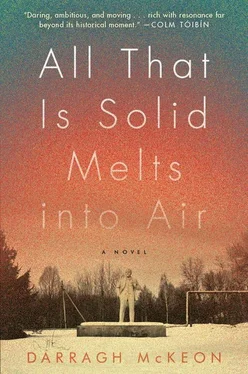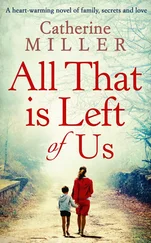Finish with the cuffs.
She hangs the pressed shirts on the top of the door, the tips of the metal hangers digging into the wood. Even though she’s long since tired of ironing, she still finds pleasure in the smell, a richly satisfying odour, as comforting on the nostrils as baked bread.
She and Maria make two salaries, and she has this laundry money on the side, and Maria contributes with her teaching money, and still it’s not enough. It’s not as if they gamble it all away, or drink it all, or buy expensive creams and perfumes. They barely have enough to clothe and feed themselves. Nearly half their food they buy under the counter, because they have to; otherwise, they’d starve. She should open a shop, provide a service people really need, become a butcher.
Maria’s salary helps. The salary, if she’s honest, surprises her. Alina never thought her little sister would be able to stay with a dull job. She always lacked that kind of consistency. Things have always come so easy for her. Yes, her looks play a part, but she has a way, a kind of grace. Barriers open for Maria in a way that they don’t for her. Even now. Look at the teaching thing, dropping out of the blue. People would kill for that kind of work. It’s why she can be so fucking righteous about their father. She doesn’t know what it’s like to have to weigh up the options that are available. Maria has always had another way out. People, their father included, don’t compromise because they want to, they just run out of choices. What was he to do? Tell them no? Tell the KGB he considered them to be morally flawed? Please. The man had a family. Have a child, then she’ll understand.
Alina irons a shirt with yellowed stains at the armpits. She’s become used to these sights, she’s seen far worse. Don’t even get her started on underwear.
But yes, Maria’s recent consistency is impressive, and she’s wonderful with Zhenya and she’s her sister. Maria has helped bring them to this point, Zhenya’s future laid out in front of him. And Alina can take a satisfaction in knowing that all her struggles have, in the end, been worthwhile. She has a son and a sister, and the marriage at least brought them the apartment. This she regards as Kirill’s legacy, not Zhenya; the boy is all hers—laying him in a laundry basket for the first two years of his life, sleeping in the same bed as him all those years when she couldn’t afford an extra mattress, an abundance of reasons for her to lay full claim on the child—but his military service made their home possible. Without it, she can’t begin to imagine what they’d do.
A key rattles in the door.
She puts down the iron. Her arm hairs riffle with suspicion, a mother’s instinct. It’s Yevgeni. She hears him hanging up his jacket, the rasp of synthetic material, and this confirms it: Maria wears a good woolen coat that Grigory bought her years ago. She puts down the water squirter and takes a breath. She puts her hand on top of the iron. There might be a rational explanation for this.
He freezes at the open door, no idea she’d be here. He steps aside, a frantic rustle. Something different about him; she can’t place it. She’s left the ironing board, pacing towards the door, and he passes again, down the corridor to his bedroom. It strikes her then: only socks on his feet. He came in wearing a pair of running shoes, expensive, from the West.
“Zhenya!”
He makes a burst for his room; she follows, gaining; the boy disappears inside, slams his door. All of this taking maybe half a second.
“Zhenya!”
She works the handle. Locked, obviously. She’s been meaning to take the bolt out, he’s getting to that age.
She bangs her fist against it.
“Open this door at once. Why aren’t you at rehearsal? I have a right to know.”
“I didn’t go.”
If Kirill were here, as he should be, being a father, he’d break the door down. Another reason not to be a hero. She thinks about doing the same. It’s a flimsy door, it wouldn’t be difficult. But there’s something unsightly about a woman putting her shoulder to a door, even if it is her own son’s, even if he deserves it. She knows it would lessen her authority, in a way she couldn’t explain.
She paces back up the corridor. Reaches up to the shelf over the coats for the running shoes, takes them down. Light blue. Soft on the insides, lightweight, well stitched, a logo on the sides. She carries the evidence back to his door.
“I’m holding them in my hands, Zhenya. Tell me right now.”
Silence.
“The last thing…” She’s so angry she can barely get the words out. “Believe me, the last thing we need…”
Silence.
She bangs on the door again.
“I won’t have this conversation from behind a door.”
“Fine. I don’t want to talk about it.”
“I am your mother. This isn’t a hotel.”
“I know. If it was they’d leave me alone.”
“He decides to be funny. He decides he’s a big enough man to be smart. Be smart, see where it gets you. Be smart, your recital two weeks away. You don’t know this yet, but believe me when I say—I am your mother, believe me—‘there’s nothing in life…’”
“‘…so tragic as a wasted talent.’” His voice is muffled behind the door, but she can tell he’s saying it as if he’s reciting a nursery rhyme, a mockingly sing-song tone to his voice.
Her will beginning to break. “Zhenya, please. I only want what’s best for you. Open the door.” Her voice wavering.
Neighbours knocking on the wall. The superintendent will be up again. She can’t, on top of everything, afford to get an official warning. It won’t help anything if they’re homeless.
Nothing.
“Fine. You’ll have to come out, to eat, to pee. I’ll be waiting.”
She leans her back against the door, then slides down. This is just the beginning. Everything coming undone. It had to happen. She expected it, deep down. She starts to cry. Hopefully, he’ll hear her. She flings the running shoes down the corridor and they bounce off the walls, bounding into the kitchen, their energy somehow igniting hers again.
“They’re going out the window,” she calls back as she stands up and follows them, makes a point of sliding open the balcony door as loudly as possible in protest. Holds them in her hand, dangling them from their laces, pulls back her arm. But of course she can’t follow through. Who knows where he might have got them? They could belong to someone else, and, besides, good footwear can’t be wasted. They’re well made, they’ll last. They’re not a family that can throw good clothes away, even those of dubious origin. She looks at them, hanging from her fist, turning slowly in unison, joined in their fate, and she remembers she’s left the iron on.
She moves to unplug it, does so and leans against the counter. A shirtsleeve lifts in a stream of breeze, and she turns to the freshly pressed shirts lined up on their hangers, and reaches over and drags them all down, dropping with them. She grabs the whole bunch of them and wrings them into a bundle and bites them, bites down hard, stifling a scream, and they lie there, twisted, until Maria comes home.
Mr. Leibniz lives in an old apartment in the Tverskoy district, in the same rooms where he spent his childhood. The walls are wood-panelled, faded and warped now, with intricately moulded covings and large double windows that open out onto the street. The building is four storeys high, weathered turquoise, with the brickwork showing in large, damp patches at street level, varnish peeling off the windows.
Maria has only been here in summertime, to watch Yevgeni play. She likes coming here; it has the same old-world look as their street in Togliatti. Approaching it alone, through narrow, cobbled streets and courtyards, allows her to relive some of her childhood, to gaze up at the high windows smattered with men in ushankas looking down upon her. Walking through the place allows the everyday to slip, momentarily, into the background. The stairway of the old house has an ancient smell, a nutty mustiness. She walks past the first landing, where Mr. Leibniz’s neighbour peeks his stubbled face out of his door, noting her arrival. Up two more flights. On each one, the steps are coloured with a mosaic of light from the small stained-glass window above the landing, each window cracked in its own distinctive way, a triangular notch missing from the first, the second with a hairline fracture that runs diagonally along its length which someone taped up years ago, so that now the tape has its own particular antiquity, parched and glossy, delicate to the touch.
Читать дальше












